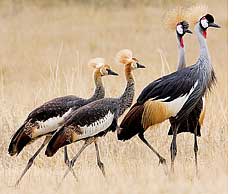Some birds respond better to habitat change
 it's usually believed that climatic factors like temperature and rainfall have a big say in birds selecting their breeding and feeding ranges. But a new aspect of bird behaviour has come to light with a study published in Conservation Biology (Vol 22, issue 1, February 2008). It reveals that some birds respond better to human-induced changes.
it's usually believed that climatic factors like temperature and rainfall have a big say in birds selecting their breeding and feeding ranges. But a new aspect of bird behaviour has come to light with a study published in Conservation Biology (Vol 22, issue 1, February 2008). It reveals that some birds respond better to human-induced changes.
The study was conducted by Nicola Okes, Phillips Hockey and Greame Cumming of the Fitz Patrick institute of University in Cape Town, South Africa. The researchers studied 86 waterbirds species of southern Africa for which reliable distribution maps could be obtained. Waterbirds proved convenient subjects as they have a small range.
The University of Cape Town researchers found that certain species like white faced duck, grey headed gull, African spoonbill, grey headed swallow made use of reservoirs and dams for breeding and feeding and so they could expand the range of their habitats. In contrast, some species like grey crowned crane, yellow billed stork could not adapt to environmental and developmental changes and consequently their range shrunk. The researchers say their study will help conservation activities become more predictive rather than responsive. "It will help conservationists respond to potential species declines before their population gets endangered,' the researchers say.
